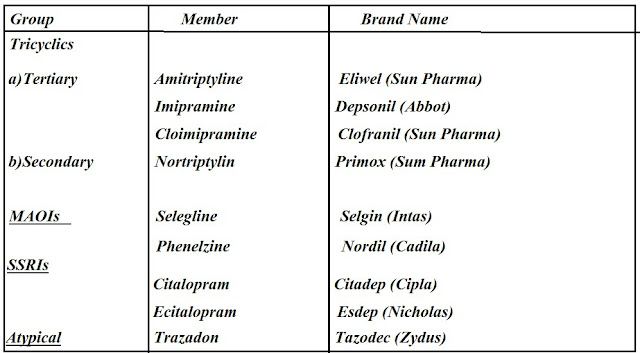Depression and Parkinson's Disease (PD)
Although this post is the third in a series of antidepressants, it is important to note that depression is one of the most common causes of Parkinson's disease.
Depression, anxiety, and psychoses are just like any other illness which just needs full support from the family. This is because dementia and Parkinson's Disease are often caused by unnecessary worries and depression.
MAO (MONO AMINE OXIDASE):-
Monoamine oxidase (MAO; EC 1.4.3.4.) is a mitochondrial enzyme system that is widely embedded in cells throughout the body, with high levels of exposure in gastrointestinal and liver, and neuronal tissues. This enzyme promotes the oxidative amino degradation of various types of monoamines and has the potential to break down any monoamine that is endogenous (produced inside the body) or exogenous (which can be a medicine given externally).
This enzyme disrupts and inactivates the monoamine neurotransmitters such as noradrenaline, dopamine, and serotonin, released for intercommunication of the neurons. Monoamine oxidase inhibitors, also known as MAOIs, are drugs that have been developed to inactivate this enzyme for neurodegenerative and depressive disorders such as Parkinson's Disease (PD).
MONOAMINE OXIDASE INHIBITORS(MAOIs)
These MAO enzyme inhibitors are of two types. They are MAOI-A and MAOI-B.
MAO-A and MAO-B inhibitors are in clinical use for the treatment of mental and neurological disorders (Parkinson's disease), respectively.
The clarity in studies of the active components of the molecules of these enzymes has led to the development of new compounds that inactivate these enzymes.
However, most of these enzyme inhibitors are irreversible. Although these are very decisive, the consequences are severe. So doctors do not prescribe many of these medications for depression now. However, they are still used especially for Parkinson's disease. Examples are Selegiline and Rasagiline.
The most important of these side effects is the Cheese Effect
People taking these drugs should avoid the following foods that may contain the amino acid tyramine. If not they may have complications such as heart attack and headaches. If you want to eat those foods you can take them a few hours after taking the medicine. However, it is better to consult a doctor.
Tyramine Foods
1. Chronic Stored Protein Foods (eg) Cheesecake, Meat
2.Chocolate
3. Citrus fruits, stored avocado (elephant guava), bananas, fruits such as raisins.
4.Pickles
5.Wine made from soaked grapes.
Sweets such as chocolate contain not only tyramine but also norepinephrine and serotonin. Taking all of these in combination with MAOI drugs can lead to a dangerous condition called 'Adrenergic or Hypertensive Crisis'.
MAO enzymes generally react and express their effects as follows.
1 2 3 1A 2A 3A
RCH2NH2+O2+H2O⟶RCHO+NH3↑+H2O2
MAOs ↑
The above chemical equation can be explained as follows.
1.A monoamine
2.Oxygen.
3.Water
After MAO ↑ oxidation ()
1A. An aldehyde (toxic)
2A. Ammonia (toxic)
3.A. hydrogen peroxide (toxic)
All of the above toxins are caused by MAO oxidation. This condition can be caused by a number of illnesses, including depression. Under normal health, our body decomposes, detoxify and excrete these aldehyde and hydrogen peroxide toxins further by enzymes such as aldehyde dehydrogenase, catalase, and superoxide dismutase.
But this structure often collapses when subjected to frequent mental stresses, leading to Parkinson's and depressive disorders.
MAO Inhibitors (MAOIs) for Depression
These monoamine oxidase enzymes are classified as MAO-A and MAO-B. MAO-A can cause depression. It often targets neurotransmitters such as norepinephrine, adrenaline, and serotonin, that cause depression. The following medications disable this enzyme and relieve depression. But these should not be taken without a doctor's prescription. They are,
1.Isocarboxazid- (Marplan)-Nonselective & Irreversible
2.Phenelzine - (Nardil)-- do-
3.Selegiline - (Selgin)-Irreversible & MAO-B-I
4.Rasagiline - -do-
5.Safinamide - -Reversible & MAO-B-
6.Moclobemide - -Reversible & MAO-A -
Of the drugs mentioned above, those labeled as Nonselective and Irreversible have the potential to cause irreversible inaction of both the enzymes. They are very strong in action but have more side effects. So doctors do not recommend this much.
Those labeled as Selective and Irreversible have the ability to disable selectively and irreversibly either MAO-A or MAO-B. These are somewhat safer than the other. These include selegiline and rasagiline. These are used for Parkinson's disease.
Those labeled as Selective and Reversible have the ability to inactivate selectively and reversibly MAO-A or MAO-B.
These are safe but less effective. The new drugs in this category are safinamide and moclobemide. Of which safinamide is beneficial for Parkinson's disease and others for depressions.
MAO-B inhibitors are commonly used for Parkinson's disease. The reason is that MAO-B is the one that most often breaks down dopamine.
Parkinson's Disease and Dopamine: -
 |
| Fig-1 Dopamine Vs GABA |
In the picture above, is the basal ganglia and some of its parts mainly the striatum gland and the substantia nigra are shown. This has been where man's stability, organized movements, for example standing, sitting, responding to others with a moving facial expression, memory, intelligence, intellectual abilities, etc. are embedded.
Especially in this part of the human brain is being the rational wisdom and intelligence embedded.
All of the above will be jeopardized if this place is affected.
For example, if it is affected by high dopamine secretion, it can lead to Schizophrenia. Decreased dopamine secretion can lead to Parkinson's disease (see pictures above)
As you can see in the pictures above, dopamine flows from the substantia nigra to the striatum gland. In the picture, it is shown with a green curved arrow. Once it gets the dopamine it needs, the striatum gland secretes GABA to control the dopamine low. This is a continued cyclic process by nature.
Click here to read more about Parkinson's disease.















